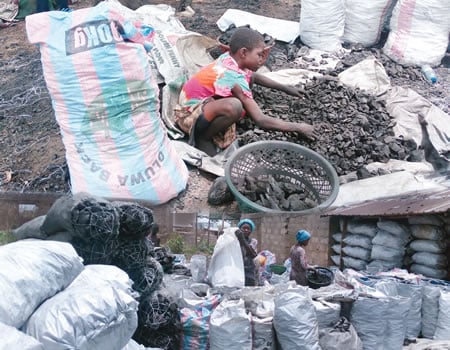Iganna community in Iwajowa Local Government Area of Oyo State is a rural community. And like other rural communities, the inhabitants of this sleepy town which is almost two hours from Iseyin town and the next major community after Okeho, live a simple life characterised by low population density; fewer people with homes and businesses located far from one another. YEJIDE GBENGA-OGUNDARE reports that though a resource-based economy, with people making their livelihood from farming and crafts, Iganna is Oyo State’s land of hidden wealth through production and exportation of charcoal.
The land mass is an irregular terrain; sometimes smooth with tarred road lined on both sides with cassava cuttings left to dry and at other times rough, calling on the expertise of drivers to make the journey less hazardous especially when one is on top a motorbike, in the midst of sprawling cashew plantation that seems the major inhabitants of the land in its sentry-like position, creating a border all around the town especially on the dusty roads on the outskirts.
And at noon, the community is very quiet, with everyone already away at their plantation and place of craft eking a livelihood. The open land gives an illusion of a town with few people, with pupils walking long distances on their way home from school while the few people who do business at home gaze after strangers, watching them surreptitiously to know what they are up to, though with friendly smiles. Welcome to Iganna community, a town being overlooked by many but is in reality, a silent wealth producer through charcoal production and exportation.
In Iganna, charcoal production is a major business which has become hereditary and is no more a job for illiterates. Though the business has transcended the borders of Iganna, no other community has moved up to be a major charcoal market with large export potentials like the Iganna charcoal community. Charcoal from Iganna is exported to Belgium, the United Arab Emirate, United Kingdom, USA, Asia and Turkey while the community is the major supplier of charcoal to every part of the country for local use and is a driving force for the town’s economy.
Charcoal, also called char is carbon made through cooking of wet logs of wood in a low oxygen environment via a cumbersome process that spans days for a normal production to get a product that burns hot steadily and produces less smoke.
Even on a large scale basis, Iganna people embrace the ancient method of charcoal production and though countries that produce charcoal have increased, Nigeria is one of the highest producers with Iganna town, the main production site and market.

Statistics reveal that charcoal production around the world over rose by an annual 3.7% from 1990 to reach 44 million tonnes in 2000. Indeed, the Food and Agricultural Organization (FAO) of the United Nations states that over 40million metric tonnes of charcoal are consumed globally and approximately 2.4billion people rely on wood and charcoal for their daily fuel.
FAO rates Nigeria second to Brazil in the production of charcoal and adds that western countries prefer Nigeria’s charcoal because the country is rich in tropical hardwood, which burns slower and is hotter. According to the body, the charcoal industry in Nigeria is a multimillion naira one with an export value of 380,000 metric tonnes of charcoal annually while it is a multibillion dollar industry globally.
Export of charcoal is an all year round business that experiences a slight dip between July and September. And exporters of charcoal make so much from countries like Belgium, Holland, France, Germany, UK and Denmark; exporters make so much during the summer (May to August). The European market gives out orders from September to May of the following year while in Asian countries; orders are placed all year round. The United Kingdom followed by Dubai remains one of the largest consumers of charcoal and most products from Nigeria go to these countries.
And in Iganna, major production of charcoal is done on the outskirts of town in Eleko kan community, which is about 30 minutes journey on motorbike from the main Iganna town and a journey that puts pressure on the shoulder blades and spine of the traveler as you move over dusty and slopy roads that were once tarred but have no remnant of tar and leaves the traveller looking like a brown alien.
According to Mr Olaniyi Jelili, the Chief Executive Officer of Jelap Resources Limited in Eleko kan, on the outskirts of Iganna, charcoal production is a big business which though cumbersome, gives good profits, adding that either through imports or local sales, charcoal is a viable business both for producers and bulk traders.
According to him, production of charcoal in Iganna has gone beyond a means of making money but is a way of life, as every household deals in charcoal one way or the other on diverse scales. Though, graduates start on a large scale.
Charcoal producers, he stated, also export charcoal dust to UK where it is blended with coconut shells from Brazil and used to mould refined charcoal blocks for sale. These molded charcoals according to him are sold in big stores across UK but cannot work like the normal charcoal.
Other countries known for large consumption of charcoal include Belgium, France, Netherland, Holland, Spain, Denmark, Germany and Bulgaria.
In Iganna, producers use the traditional pit method of burning logs of wood from the forest and in addition use waste wood from logging companies, building contractors and furniture makers.
Speaking on charcoal production, another big charcoal merchant, Alhaji Mojeed Osuolale Alaka states that charcoal production can only be done by anyone that can persevere as it is not a job for lazy people.
“It is stressful and cumbersome to produce charcoal. You know what we use are logs cut from wet trees, how easy is it to burn wet trees? It is quite difficult and it takes a long period. It should be noted that we don’t just burn trees; there are techniques involved that one must learn if you are a stranger.
“Basically, for those that inherited the trade, they grew up in the business and are already familiar with procedures as well as challenges but for strangers, it is not that easy, they have to learn a lot of things. For example, how to burn particular types of tress because we use various trees for this, like the Ayin, this takes special treatment,” Alhaji Alaka stated.
Nigerian Tribune tour around charcoal factories in Iganna and Eleko kan revealed that many big factories do more of exportation as they get requests well ahead and are often very busy all year round. Charcoal producers are well established that they do not consider diversifying, rather, their aim is continuous expansion and penetration into the international market.
Alhaji Alaka in his interview told Nigerian Tribune that in the five years he had engaged in production an exportation of charcoal, he has reaped great profits and he is sure that the charcoal business cannot be eradicated.
“I have been doing this for five years and I sell locally to Lagos and I also export to Dubai. We always have requests for supply of charcoal and once we produce, there are customers waiting to pack the charcoals. There is no charcoal that cannot be exported but quality differs.
However, it takes an experienced person to differentiate charcoals based on quality. Here, our graduates don’t waste time looking for employment. Once they raise a small capital, they attach to a big producer and start exportation.
“We are close knit and we get business links for one another. We also mentor the young ones so they won’t make mistakes. We are an export oriented market and often when we sell locally, it is on a large scale. This business is overlooked but it is one that the government needs to pay attention to and fund because it has very high potentials for foreign exchange earnings,” Alhaji Alaka concluded.

Charcoal for exports are usually shiny, very dry; clean with no dirty particles and contains no half burned wood pieces. To ensure this quality, producers engage people, usually women or young girls and boys, to sort out the dirt from finished charcoals
Nigerian Tribune found that the charcoals are usually in three broad categories: industrial, barbecue and industrial with the barbecue in huge demands in the United Arab Emirates market.
The charcoal is categorized based on sizes and according to research, the industrial category falls within a size of 20mm to 60mm, the most popular based on demand from foreign countries is the barbecue which falls within the range of 20mm to 80mm and the third category, restaurant is between 20mm to 140mm.
Though there isn’t much vehicular traffic around Iganna, as one only meets few cars and many motorcycles for hours at a stretch, trucks and trailers ferrying bags of charcoal are a common feature while many small scale producers also transport their wares on the motorcycle.
And in front of almost every house in Iganna, sacks of charcoal and mounds of charcoal dust are a common and permanent fixture. So like local crafts associated with southwest communities, charcoal production and exportation remains a goldmine that is overlooked by many. And unless adequate attention is given, charcoal production may become another goldmine laid to waste.
WATCH TOP VIDEOS FROM NIGERIAN TRIBUNE TV
- Relationship Hangout: Public vs Private Proposals – Which Truly Wins in Love?
- “No” Is a Complete Sentence: Why You Should Stop Feeling Guilty
- Relationship Hangout: Friendship Talk 2025 – How to Be a Good Friend & Big Questions on Friendship
- Police Overpower Armed Robbers in Ibadan After Fierce Struggle






